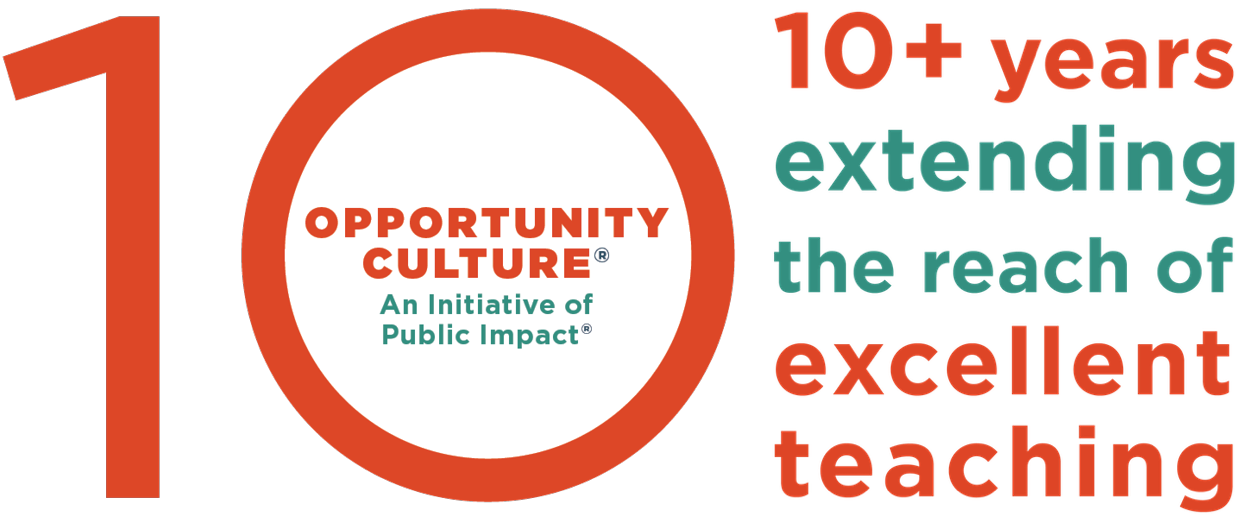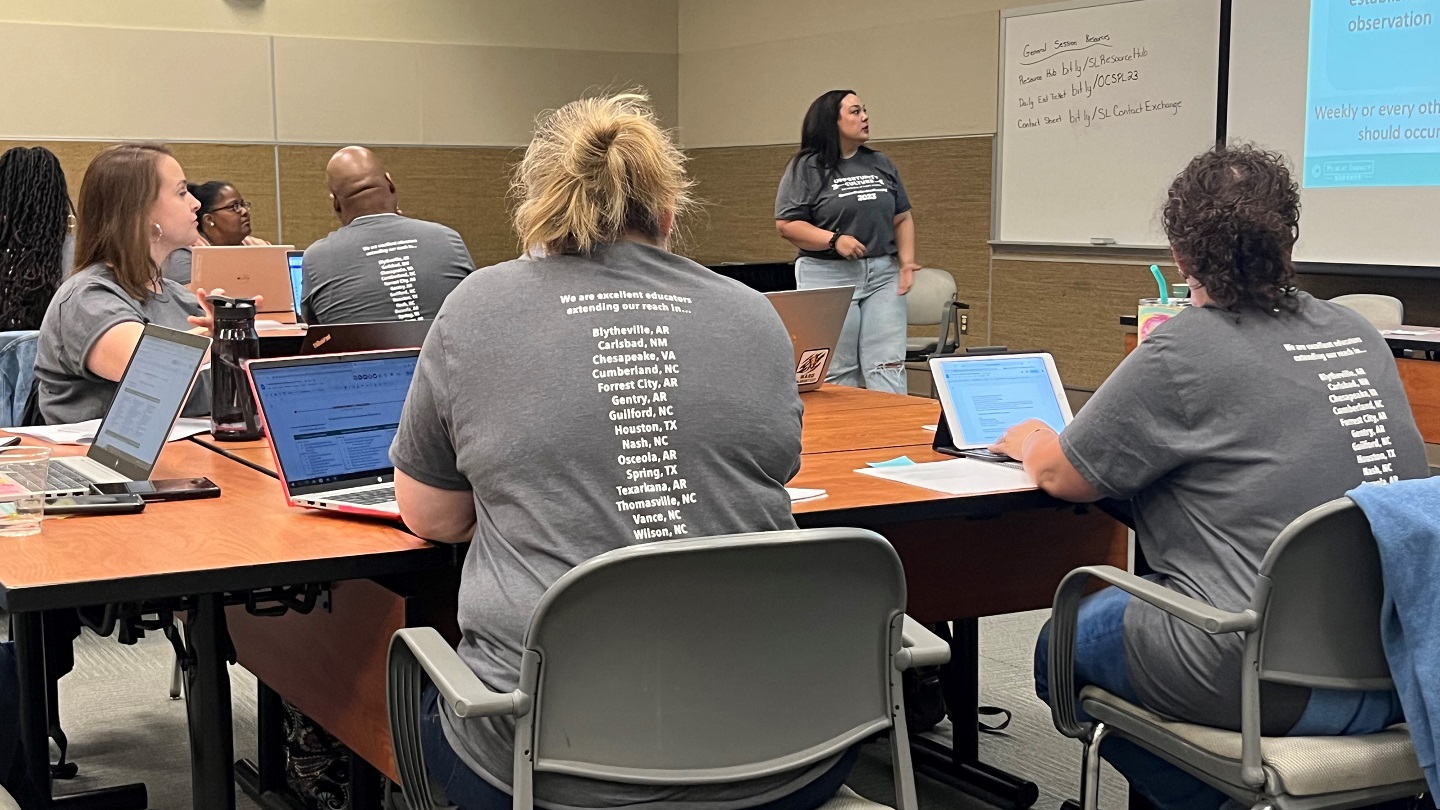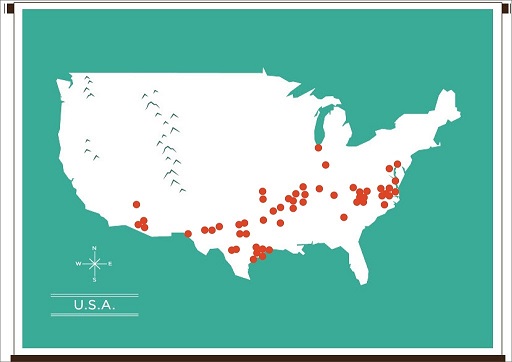For Interested State & District Leaders
Create a legacy of results that last
Make the one decision that could meet your goals for students and educators: Commit to reaching all students with excellent teaching, consistently, and all educators with outstanding, paid career opportunities.
How Opportunity Culture® Teaching Teams Help Students
Rigorous third-party research shows that when teachers join teaching teams led by proven teachers in the Multi-Classroom Leader® role, students get an extra half-year of learning growth in reading and math, on average. This means that an average teacher on one of these teams gets student growth as high as today’s top 25% of teachers.
Schools are much more likely to make this type of high growth when teachers on these teams earn more for reaching more students, in addition to the team leaders themselves. That’s because schools no longer need to assign students to low-growth, long-term substitute teachers.
This team structure makes it possible to reach all students with in-school, routine small-group tutoring. More than a hundred studies show that small-group tutoring by paraprofessionals and teachers boosts student learning by an extra year or more. And when students learn more, they can get better jobs and earn more. Read more about our strategy and the results.
Learn More
For a general overview of the Opportunity Culture® initiative, register for our free, 45-minute session, Opportunity Culture® Info Session: Unique, Effective Staffing Design.
How Opportunity Culture® Teaching Teams Impact Economies
Students in these teams’ classrooms will earn over $100,000 more in their careers, on average.*
That boosts local economies fast—and the more schools that adopt the models, the bigger the local boost.
And the more schools using these models statewide, the bigger the boost to the state’s economy.
In an average state, implementing these models statewide would add $6 billion to $10 billion to the economy over 16 years, if three-fourths of schools make the transition rapidly.* Increased tax revenues could be used to pay teachers more and meet other priorities.
*Using McKinsey’s calculations; see McKinsey & Co. (2009). The Economic Impact of the Achievement Gap in America’s Schools, or see our more conservative estimate applied to one state
Make Your Commitment!
We can help state leaders create their own statewide Opportunity Culture® initiative, and offers several price points for design assistance to districts to plan implementation of these models.

Nationally, we are the largest, longest-standing provider of school staffing design with proven results, with over 10 years of data about what works—and doesn’t—in school redesign.
Students
In 2024–25, these models will reach nearly 200,000 students—more than the 10th-largest school district in the United States and the country’s largest charter school network—in urban, suburban, and rural districts, and in states with and without collective bargaining.
We get ratings in the “excellence zone” every year on client surveys and feedback. We are an expert team that includes many former teachers and principals with years of experience helping a diverse range of schools and school systems. We have institutional expertise in roles, pay, selection, schedules, budgets, instruction, and leadership.
OUR SERVICES

School Staffing Design with Results
Our core suite of consulting services offers expert coaching for district and school teams to design new roles, career paths, pay, schedules, budgeting, instruction, and more, at a range of price points. Teams can supplement design and implementation with live professional learning for CEU credit, and monitoring and feedback services.

Certification and Validation
Schools and districts can go further by receiving Opportunity Culture® certification and validation, to attract applicants looking for support and career paths and families looking for excellent schools, and communicate with their community, state, and funders about the strength of their instructional system.

The Opportunity Culture® Portal
Our affordable online platform guides schools through staffing design, certification, and how to monitor, analyze, and improve Opportunity Culture® implementation, and it offers extensive professional learning for site directors and educators in Opportunity Culture® roles.

Professional Learning Sessions
Our engaging, research-based, in-person and virtual, live professional learning sessions support teachers, teacher-leaders, principals, staff, and administrators in districts using these models. The sessions build their expertise in their Opportunity Culture® roles and specific aspects of leadership and instructional excellence, such as building a tutoring culture.
Ready to make a commitment to your students and educators?
State leaders: Let’s discuss options for your state!
District leaders: Check out our consulting services!
STORIES OF OPPORTUNITY CULTURE® EDUCATORS
Educator Columns
From teacher-of-the-year to teacher resident, we share stories of educators from districts across the country. Whether in their own words or ours, their message rings clear—teachers love these roles!
Voices on Videos
Our team loves visiting schools, gathering voices of educators talking about their roles. Watch our extensive library of videos to see how these models transformed their schools.
Opportunity Culture® Audio
What have educators in Opportunity Culture® roles learned about successfully redesigning schools to reach all students with excellent teaching? Our audio pieces bring their advice to help confront some of the stickiest issues facing education.

More districts and charter school organizations—large and small, rural and urban—commit to these models every year. See examples of these sites here!
Want to see these models in action?
Register to watch a free virtual visit to two districts using these models extensively!
If you truly implement the model the way it is intended, I believe that every school district can make this work for them.
—Kelly McLaughlin, Arkansas DOE, Quick Takes: Leading Opportunity Culture® at the State Level
“
